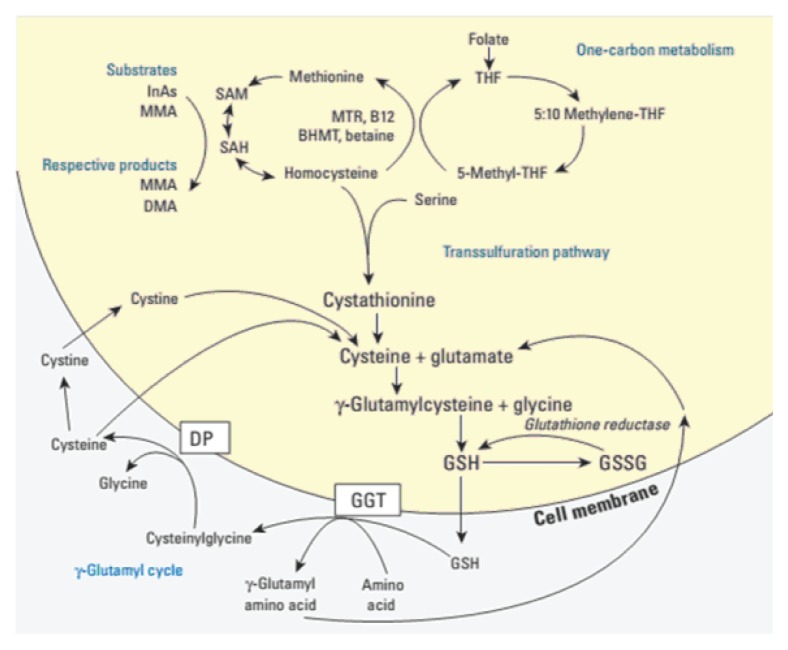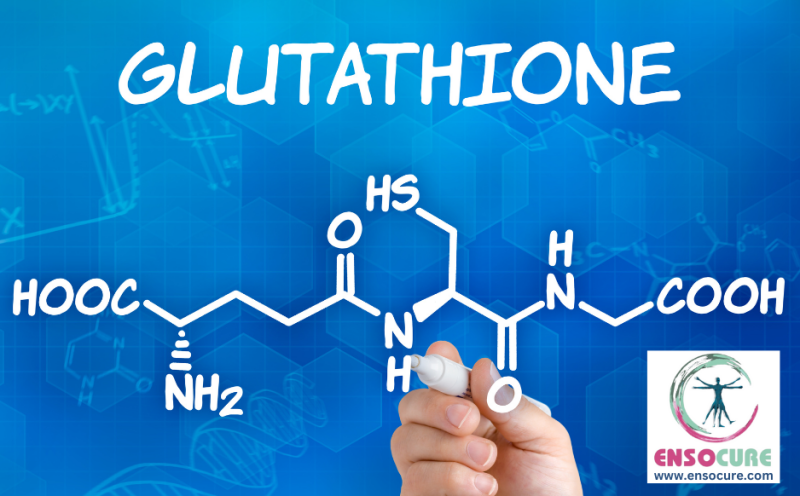There are several benefits of glutathione but if you look for glutathione online in India, you most probably are going to see how it is targeted mostly for skin whitening. Of course, in a country obsessed with fairness, it serves a more profitable purpose to promote glutathione for skin, but while yes, it is excellent for skin health, there is much more to glutathione than just being something good for your skin. It is a major antioxidant involved in several major detoxification and cellular processes in the body. In fact, glutathione is considered the master antioxidant.
What is Glutathione

Glutathione is a powerful antioxidant, and anti-inflammatory, but to be more medically specific, it is a tripeptide produced in the liver and consisting of three amino acids: cysteine, glutamic acid, and glycine. Glutathione plays a significant role in protection, detoxification, CTL activation and various physiological processes within the body. It is found in high concentrations in most cells which is surprising considering the complex high level of metabolic activity required to produce it in the body. It is as abundant as glucose, potassium, and cholesterol, but bad lifestyle habits like alcohol and smoking can reduce it. There are two different forms of glutathione that exist in your body, reduced glutathione (GSH, or L-glutathione), which is the active form, and oxidized glutathione (GSSG), the inactive form. As glutathione completes its task of rounding up and killing free radicals, it gets oxidized and inactive turning into GSSG which is 2 reduced glutathiones bound to 2 sulfur atoms.
Glutathione and GGT
Gamma-glutamyl transpeptidase simply known as GGT or GGTP in a Liver Function Test is an enzyme found throughout the body, but mainly in the liver. It is an important biomarker of liver health, viral hepatitis including cardiovascular disease, diabetes, metabolic syndrome. GGT is also an early predictor of atherosclerosis, arterial stiffness and plaque, heart failure, gestational diabetes, other infectious diseases, and several life-threatening cancers. While GGT contributes to amino transfer and leukotriene conversion, its primary function is the metabolism of glutathione. Because of this, research hypothesizes that GGT is also a biomarker of glutathione depletion which means that in the absence of major disease, glutathione supplementation could be considered for reducing levels of GGT which is a significantly important consideration among the benefits of glutathione.
Benefits of Glutathione
Antioxidant Defense: Glutathione helps protect cells from damage caused by free radicals which cause oxidative stress, chronic diseases, and aging. It exerts direct chemical neutralization of singlet oxygen a reactive oxygen species, hydroxyl radicals and superoxide radicals, nitric oxide and carbon radicals in the body. Glutathione catalytically detoxifies: hydroperoxides, peroxynitrites, and lipid peroxides. It also protects cells by recycling vitamins C and E.
Detoxification: Glutathione detoxifies and eliminates toxins in the liver, lungs, intestines, and kidneys. It also helps remove harmful substances, including drugs, pollutants, and carcinogens. It neutralizes free radicals and plays a role in the detoxification process of phase I and phase 11 liver metabolism in the body including being a cofactor for several antioxidant enzymes.
Immune System Support: Among the major benefits of glutathione, it improves immunity by maintaining the optimal functioning of immune cells, such as T cells, B cells, and natural killer cells, contributing to overall immune system health.
Brain Health: Glutathione transports mercury out of the cells and the brain. Moreover, adequate levels of glutathione in the brain prevents motor neuron and myelin degeneration. Myelin is the protective sheath around nerves which are also found in the brain and spinal cord. Glutathione present in the brain contributes to oxidative stress and detoxifies an overload of reactive oxygen species (ROS) and free radicals in the brain. It also improves memory and cognitive function, including protecting against risk of cognitive decline and conditions like Alzheimer’s. Studies have found how reduced glutathione function in the brain is linked to loss of neurons in aging and neurological diseases such as Huntington’s disease, Parkinson’s disease, stroke, and Alzheimer’s disease.
Mitochondria Repair and DNA Synthesis: Glutathione is essential for DNA synthesis and mitochondria repair, protecting cellular genetic material and supports the maintenance of healthy cell function. During energy production in mitochondria, oxygen is used to make ATP (adenosine phosphate). The process also produces superoxide, a toxin that can damage mitochondria and all the cells around it. Glutathione is then called upon to extinguish superoxide and neutralize it before it begins to damage the mitochondria themselves.
Anti-inflammatory Effects: Glutathione has been shown to have anti-inflammatory properties. It can help modulate the immune response and reduce inflammation, contributing to the overall well-being of the body.
Antiviral Properties: Some studies suggest that glutathione may have antiviral properties. Ongoing research is now trying to understand its potential role in supporting the immune response against certain viruses.
Anti-Aging: As an antioxidant, glutathione reduces oxidative stress, slowing down the aging process. Maintaining adequate glutathione levels may contribute to overall health and longevity.
Glutathione and Skin health
There is mixed debate of skin whitening being among the benefits of glutathione. Given its antioxidant and anti-inflammatory properties for general health, it is obvious that the benefits will be evident in skin as well. However, to solely project glutathione as a skin whitening agent and promote intravenous glutathione for the same is a practice frowned upon by the experts. Most scientists feel, there is a lot of hype surrounding the antimelanogenic properties of glutathione resulting in rampant commercial promotion of it as a skin supplement and wonder drug for skin lightening and hyperpigmentation. Unfortunately, there is limited evidence to prove so but, despite of that in the absence of regulatory laws, glutathione is blatantly marketed as a skin serum. It is glutathione’s effect on inhibiting tyrosinase, the key enzyme of melanogenesis and switching from eumelanin to phaeomelanin production that is responsible for it being regarded as skin whitener.
One research paper states that “the adverse effects caused by intravenous glutathione have led the Food and Drug Administration of Philippines to issue a public warning condemning its use for off-label indications such as skin lightening.”
Studies have also found harmful effects of glutathione toxicity in high dosages through the IV route such as thyroid dysfunction, skin rash, abdominal pain, and liver problems.
Other Benefits of Glutathione.
Among additional benefits of glutathione, it detoxifies other environmental toxins such as many solvents, herbicides, fungicides, polycyclic aromatic hydrocarbons, and lipid peroxides.
- Might help in autoimmune disease
- Might improve insulin resistance
- Reduce respiratory disease symptoms
- Improves heart health
- Reduces cholesterol
- Improves skin disease
Glutathione and Vitamin C
Vitamin C and Glutathione may work together synergistically to protect and strengthen some tissues in the body by protecting them from excessive oxidative stress? Glutathione helps “recycle” vitamin C, in the body, maintaining its antioxidant activity and effectiveness. In turn, vitamin C helps regenerate glutathione, ensuring a continuous cycle of antioxidant protection within cells.
Vitamin C (ascorbic acid) is an essential water-soluble antioxidant that scavenges free radicals and helps protect cells from oxidative damage. When vitamin C neutralizes a free radical, it becomes oxidized itself. Glutathione, in its reduced form (GSH), can help regenerate vitamin C by converting it back to its active, reduced form (ascorbate). This process allows vitamin C to continue its antioxidant functions.
Both glutathione and vitamin C play important roles in supporting the immune system. Vitamin C is known for its immune-boosting properties, while glutathione contributes to the proper functioning of immune cells. Their collaborative action is particularly relevant in promoting immune health.
Sources of Glutathione
While there are no specific foods that are extremely high in glutathione itself, there are several foods that contain the amino acids (cysteine, glutamic acid, and glycine) and other nutrients needed for glutathione synthesis. Here are some foods that can support the body’s production of glutathione:
Sulfur-Rich Foods: Foods rich in sulfur are important for providing the necessary amino acid cysteine, a key component of glutathione. Examples include garlic, onions, leeks, shallots, and cruciferous vegetables such as broccoli, Brussels sprouts, cabbage, and cauliflower.
Protein Sources: Glutathione is synthesized from amino acids found in protein-rich foods. Good sources of protein include fish, poultry, lean meats, eggs, dairy products, and plant-based sources like legumes, beans, and lentils.
Fruits and Vegetables: Many fruits and vegetables contain antioxidants and other compounds that support the body’s antioxidant defense system. Some examples include avocados, spinach, asparagus, okra, kale, and fruits such as watermelon, grapefruit, and peaches.
Nuts and Seeds: Nuts and seeds, particularly sunflower seeds, chia seeds, walnuts, and almonds, can contribute to the amino acid profile needed for glutathione synthesis.
Herbs and Spices: Certain herbs and spices have been associated with antioxidant properties and may support the body’s natural production of glutathione. Examples include turmeric, cinnamon, and cardamom.
Alpha-Lipoic Acid Sources: Alpha-lipoic acid is an antioxidant that can help regenerate glutathione. Foods such as spinach, broccoli, and organ meats (liver, kidney) contain alpha-lipoic acid.
Fruits Rich in Vitamin C: Vitamin C is essential for the regeneration of oxidized glutathione. Foods high in vitamin C include citrus fruits (oranges, lemons, grapefruits), strawberries, kiwi, guava, and bell peppers.
It’s important to note that the body can also synthesize glutathione internally using the amino acids obtained from the diet. However, if there are concerns about glutathione levels or specific health conditions, consulting with a healthcare professional is advisable. Additionally, supplementation with glutathione precursors or direct glutathione may be considered under the guidance of a healthcare provider.
Perhaps the best way to acquire glutathione for health purposes and treatment of varying conditions is through oral supplementation or IV infusions. Research is now finding evidence how glutathione is a good choice of add on treatment for medical conditions such as heart disease, glaucoma, cancer, chronic fatigue syndrome, Parkinson’s disease and more.
Glutathione IV infusion Therapy in Bengaluru
Glutathione and Vitamin C work together to replenish and recycle one another and can offer improved effects when combined in the form of IV therapy. Glutathione is well tolerated in the form of infusions if done correctly and is one of the most preferred antioxidant used by IV Infusion therapy in India. As part of its IV services, Ensocure Integrated Medicine IV infusion clinic in Bengaluru offers glutathione infusion individually or as part of combined infusions for various aspects of medical care.
Advisory: While glutathione is a primary antioxidant produced in the body, thinking of taking supplements in excess for faster results is not recommended without a doctor’s advice. Prolonged use of glutathione has been linked to decreased zinc levels in the body. Glutathione might also trigger asthma attacks in people who have asthma. As a healthy individual, you should always focus on good nutrition where you stand to improve your glutathione levels by consuming cruciferous vegetables, garlic, onions, eggs, nuts, legumes, and lean protein (fish & chicken)
Safety Concerns: The safety of glutathione infusions, particularly when administered in high doses, is not well-established. Adverse effects and potential interactions with medications should be considered.
Before considering glutathione infusions or any other form of supplementation, it’s crucial to consult with a healthcare professional. They can provide personalized advice based on individual health conditions, potential risks, and the latest scientific evidence. Self-prescribing or seeking unregulated treatments may pose health risks and should be avoided.

